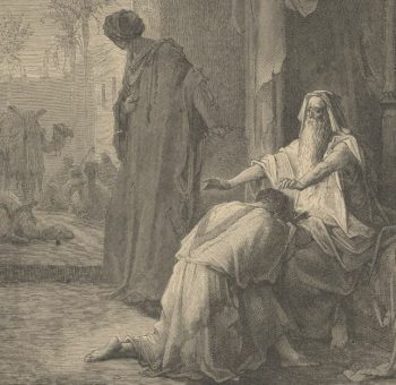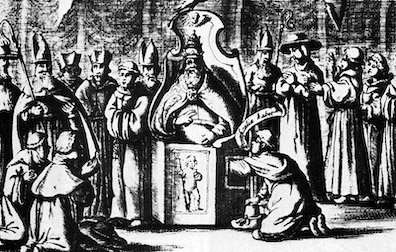When Bloom is invested as Lord Mayor, Magistrate, Chairman,
President, King, Emperor, Pope, and Messiah, he swears an oath
of office while "Placing his right hand on his testicles."
The business of swearing sacred oaths on the family jewels may
appear to be one more of Circe's wild spontaneous
fantasies, but in fact it was practiced by ancient Hebrews,
and probably also by Romans. There may even be Irish
historical analogues.
Thornton was perhaps the first of Joyce's annotators to hear
an echo of Genesis 24:2, where the aged Abraham commands his
chief servant to "Put, I pray thee, thy hand under my thigh"
and swear a solemn oath "by the Lord, the God of heaven, and
the God of the earth." The servant does so at 24:9, and at
47:29 Jacob too asks his son Joseph to "put, I pray thee, thy
hand under my thigh, and deal kindly and truly with me; bury
me not, I pray thee, in Egypt." Quoting from The Oxford
Annotated Bible, Thornton notes that Abraham's
euphemistic reference to his testicles "reflected the view
that the fountain of reproductivity was sacred to the deity."
The Harper's Bible Dictionary similarly comments that
"The hand was placed under the thigh when oaths were taken
because special veneration was given the organs of generation"
(755).
The relevance of this sacred Hebrew practice is suggested by
the words of Bloom's oath: "So may the Creator deal with
me." But ancient Romans appear to have performed a more
secular version of the action in their law courts. Slote cites
W. W. Buckland's A Text-Book of Roman Law: "In Roman
Law, a witness (testis) holds his testicles when he
swears to tell the truth, so that the truthfulness of his
testimony is guaranteed on the basis of his own procreative
powers." The ultimate etymological roots of testis and
the diminutive testiculus are obscure, but it seems
that our western traditions of legal "testimony" are carrying
forward at least some memory of men clutching their private
parts.
In an entertaining and informative 2009 blog on
cabinetmagazine.org, Classics professor Joshua T. Katz throws
some cold water on this popular understanding of Roman law
while noting similar practices around the world: "An
eighteenth-century BC Old Babylonian letter from the city of
Kisurra (in present-day Iraq) includes the words, 'Thus you
(have said to me): "Let your envoy grasp my testicles and my
penis, and then I will give (it) to you.”' Hindu and Arabian
pledges of honor from the eighteenth century AD and beyond in
which men hold each other’s private parts are described in
graphic detail by the orientalist and sexologist Allen
Edwardes. Somewhat differently, in Athenian homicide trials,
the accuser trampled the testicles of a boar, a ram, and a
bull, swearing to the veracity of his claim and invoking
destruction on himself and his family if he was perjuring
himself. These are serious oaths." There may even have been
Irish precedents. Gifford quotes from Samuel Beckett's Molloy:
"What is one to think of the Irish oath by natives with the
right hand on the relics of the saints and the left on the
virile member?"

